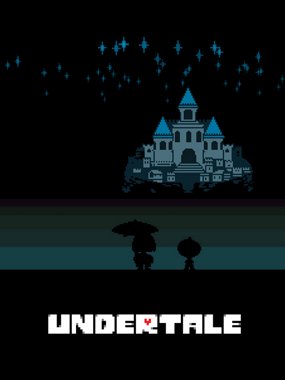Undertale

Long ago, there were two races on Earth: monsters and humans. They lived peacefully, but one "fine" day a conflict broke out between them. A war began, in which people won. Seven of the most powerful human magicians imprisoned monsters in the Dungeon using the Barrier spell. You can get there only through a small hole in Mount Abbott. Once a human child accidentally falls into these holes, for whom you are playing. What are you going to do? Fight? Or show real mercy?
Undertale will make you question the essence of games
Undertale is a pixelated RPG inspired by Earthbound. As in most projects of this genre, the character here will have a level, weapons, health points. But at the same time, Undertale, without exaggeration, breaks the mold about how RPGs should be played.
In life, we face the consequences of our actions. In games, sometimes too, but it is also difficult to worry about it. After all, this is just a game, right? You can do whatever you want. You can look at everything in the game, morally questionable or not.
Games need to reward us somehow to show that we are doing well. Defeating enemies gives experience, raising the level of the player and opening the way to more difficult locations. Battles are a stepping stone to progress. Although strategy is involved in the fights themselves, bare numbers tend to be more important, leading to practice grinding to allow progress.
We, as players, are too used to these traditions. Murder has become a central, overarching mechanic in many titles. And we yearn for this award that tells us that we are doing well, we are doing everything right in the "land of video games." Undertale makes us question this cycle, really wonder why we do what we do with humor and remorse.
A really unusual combat system
As in the aforementioned games, here you can fight random skirmishes against monsters using weapons that you find or buy along the way. Killing monsters gives you experience and, over time, a level, which in turn makes the following killings of monsters easier.
The attack of monsters is interestingly implemented - there is no usual system where the enemy attacks, and either hits or misses. You will have to dodge the attacks manually. A square appears on the screen with a heart inside, and various objects flying like bullets. The heart represents you, and you need to move it to avoid attacks.
The most interesting thing about this is that each attack is unique to the enemy that launches it. It even suits the character of the monster and is sometimes accompanied by short phrases. If you meet an enemy who loves to cry, tears will fall on the screen, which will damage you if you do not dodge them. Enemies become more personalized and interesting.
But Undertale provides another opportunity besides fighting in these battles. Command Act gives you the ability to interact with monsters in a less threatening way, potentially fulfilling their needs and ending the fight without killing. The player will open a list of actions, each of which causes a specific reaction. If you choose the appropriate option, you will calm the monster and be able to Spare him, which makes it possible to end the fight without bloodshed. But for that, you won't be given experience, which means you have to make a choice - get stronger or ... well, not get stronger.
That's right, you don't get a mechanical reward for showing mercy. You still receive money from forgiven enemies, and it takes as long to spare an enemy as it does to kill. Then what's the point? Nobody punishes you for this.
But this is only at first glance. Undertale remembers everything you did. It penetrates the head and heart. He can make you feel like a hero. Make you feel loved. Or it can make you feel like a real monster. And it will only depend on you.
Undertale has attractive, well-written characters
The only reason this works is because of the well-executed characters. You will meet different monsters, and yes, some of them will attack you, but in reality they are all just trying to live their lives. Undertale reflects this very well, giving each opponent character and motivation.
The same goes for the main characters, each with exaggerated traits. They are very cleverly and amusingly spelled out. But the best part is how quickly you get attached to them. Each boss has an intention to fight the player, but they all have an important reason to do so, and in the process you may find that you don't feel like killing them at all. Sometimes you will feel like you have no choice unless you understand how to make the Spare option available. And it makes your affection more heartbreaking.


















